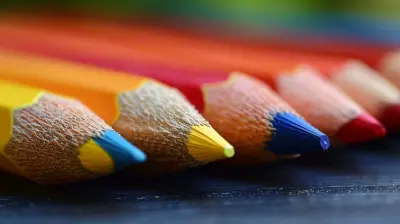2 February 2025
Education isn’t just about sitting in a classroom, listening to lectures, and taking notes. Sometimes, the best learning happens when students help each other. That's where peer tutoring comes in. It’s not a one-way street where the tutor gains all the benefits and the tutee just absorbs the knowledge. Oh no, it works both ways, and both parties—tutors and tutees—walk away from the experience richer in knowledge and skills.
But what exactly is peer tutoring, and why is it so beneficial for everyone involved? Stick with me as we break it down. By the end of this article, you'll have a new appreciation for this powerful educational tool.

What Is Peer Tutoring?
Let’s start from the top: what is peer tutoring? In simple terms, peer tutoring is when one student helps another student learn a subject or skill. It can happen in all kinds of educational settings—schools, universities, study groups, or even informal settings like community centers.The key here is that both the tutor and the tutee are students, usually of similar age, but perhaps at different levels of understanding in a specific subject. It’s a bit like one friend teaching another how to play a video game: one person is slightly more experienced, but both are learning in some way.
Now, let’s dive into the nitty-gritty: why does this work so well, and what are the benefits?

Why Peer Tutoring Works
You may be thinking, “Okay, I get it—students helping students—but why does it work?” The answer lies in the natural dynamics that exist between peers. Here are a few reasons why peer tutoring is a game-changer:1. Relatable Learning Environment
When you're learning from someone who’s in a similar situation as you—someone who understands your struggles and learning gaps—it feels less intimidating. There’s no need to impress or feel embarrassed. The tutor understands because they’ve been there too. This creates a relaxed and relatable learning environment, which is key to effective learning.2. Simplified Explanations
Teachers often explain concepts in complex ways because they’re so deeply familiar with the material. But a peer tutor, who has recently learned the material themselves, can break it down in simple, digestible terms. It’s like having a friend explain a complicated movie plot—suddenly, it all makes sense!3. Active Participation
In peer tutoring, both the tutor and tutee are actively involved. It’s not a passive learning experience where you’re just sitting back and absorbing information. The tutee asks questions, the tutor provides answers, and there’s a constant exchange of ideas. This active engagement fosters deep learning.Now that we understand why peer tutoring works, let’s explore the benefits for both the tutor and the tutee.
The Benefits of Peer Tutoring for Tutors
You might think the tutee gets all the rewards in this setup, but that's far from the truth. In fact, being a peer tutor can be just as beneficial—if not more so—than being a tutee. Here’s why:1. Reinforcing Knowledge
You know that saying, “The best way to learn something is to teach it”? Well, it’s true. When a tutor explains a concept to their peer, they're forced to break it down and truly understand the material themselves. This reinforces their own learning and solidifies their grasp on the subject.It’s like explaining a recipe to a friend. You may have made the dish a hundred times, but when you explain the steps, you realize just how well you know your way around the kitchen.
2. Building Confidence
Teaching someone else gives the tutor a confidence boost. They realize they actually know the material well enough to help others, which can increase their self-esteem and make them feel more capable. This newfound confidence can spill over into other areas of their academic life, making them better students overall.3. Developing Communication Skills
Being a tutor means you have to explain things clearly and concisely. This helps tutors hone their communication skills, which are essential in every aspect of life—whether they’re giving a presentation, writing an essay, or even just having a conversation.4. Improving Leadership Skills
When you’re a tutor, you’re the leader of the session. You’re in charge of the pace, the structure, and the flow of the lesson. This helps tutors develop leadership skills, which are invaluable in both academic and professional settings. It’s like being the captain of a small ship, navigating the waters of learning with someone else on board.5. Time Management
Tutoring requires planning, scheduling, and managing time efficiently. The tutor has to balance their own studies with the tutoring sessions, which helps improve their time management skills. It’s a skill that will serve them well far beyond the tutoring sessions.
The Benefits of Peer Tutoring for Tutees
While the tutors gain a lot from the experience, let’s not forget about the tutees. They’re on the receiving end of some pretty fantastic benefits too. Here’s how peer tutoring helps tutees:1. One-on-One Attention
In a large classroom, it’s easy to get lost in the crowd. But in a peer tutoring session, the tutee gets one-on-one attention. This means they can ask questions freely, without fear of judgment, and the tutor can tailor the session to meet their specific needs.2. Learning at Their Own Pace
Everyone learns at a different pace, and that’s okay. Peer tutoring allows the tutee to learn at a speed that’s comfortable for them. Whether they need to slow down or take extra time on a particular concept, the tutor can adapt to their needs.3. Boosting Academic Performance
With the added support of a peer tutor, many tutees see an improvement in their academic performance. Concepts that once seemed confusing become clear, and grades often improve as a result. It’s like having an academic lifeline, someone to pull you up when you’re struggling.4. Improving Study Habits
Peer tutoring isn’t just about mastering the material; it’s also about learning how to study effectively. Tutors often share study tips and techniques that have worked for them, and these can rub off on the tutee. As a result, the tutee may develop better study habits, which help them in the long run.5. Building Confidence
Just like the tutor, the tutee can gain confidence through peer tutoring. As they grasp new concepts and improve their understanding, they begin to feel more capable and confident in their abilities. This newfound confidence can lead to greater participation in class and a more positive attitude toward learning.Peer Tutoring: A Win-Win Situation
At the end of the day, peer tutoring is a win-win situation. Both the tutor and the tutee walk away with something valuable. For the tutor, it’s an opportunity to reinforce their knowledge, develop communication and leadership skills, and build confidence. For the tutee, it’s a chance to get personalized help, improve their academic performance, and gain confidence in their abilities.Peer tutoring is more than just an educational technique; it’s a partnership. It’s a way for students to lift each other up, to share what they know, and to grow together. And the best part? It’s not confined to the classroom. Whether you’re in high school, college, or beyond, peer tutoring can be a powerful tool to help you succeed.












Anna Smith
Great insights on peer tutoring! It truly fosters collaborative learning and strengthens relationships.
March 31, 2025 at 7:11 PM